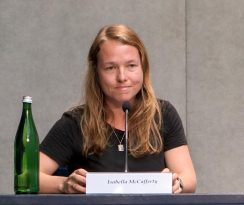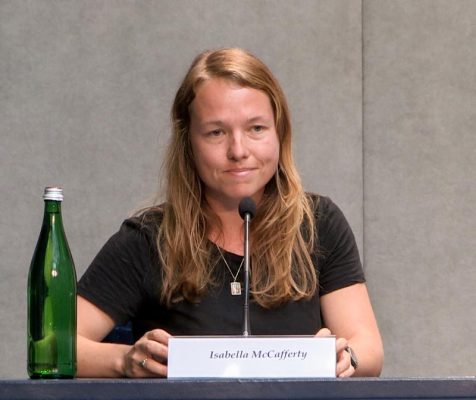VATICAN CITY (CNS) — Catholic young adults felt the hierarchy started listening to them in preparation for the 2018 Synod of Bishops on young people, and they will do whatever they can to make sure their voices continue to be heard, said a youth minister from New Zealand.
“May we be bold,” was the wish expressed by Isabella McCafferty from the Archdiocese of Wellington at a Vatican news conference June 18.
McCafferty was one of more than 280 young people from 109 countries set to take part in a post-synod Youth Forum June 19-22.
The Dicastery for Laity, the Family and Life asked bishops’ conferences around the world to identify two young adult leaders to participate in the forum, being held at a retreat center just south of Rome.
httpv://youtu.be/m2olmhcNh7g Schonstatt Father Alexandre Awi Mello, secretary of the dicastery, told reporters, “There is always a risk that after a big event people lose enthusiasm, move on to the next thing,” but Pope Francis and the dicastery are serious about not letting that happen.
“The synod on young people is in its realization phase,” he said. “There is still much to be done,” and the forum was designed to continue that conversation with young adults who are experienced in reaching out to their peers.

McCafferty told Catholic News Service: “Young people want the church to give them room to be involved. So, yes, they want their voice heard, but they also want to be part of the things that happen after that,” actually implementing changes.
Involving young people in sharing the Gospel message in ways that are relevant and makes sense to them and to their peers, for example, through the use of social media, is especially important, she said.
Young people also are deeply committed to protecting the environment, she said, and they want to be involved in the efforts of the church to reduce its impact on the environment and to promote respect for God’s creation.
Most of all, she said, young people are looking for “an authentic church.”
“Authenticity is about transparency, it’s about vulnerability at times, but it’s also about ground level, about being community,” McCafferty said. “Rather than always thinking of the church as this thing that happens in Rome, it’s about what it means to be church in our local area,” and it always involves “person-to-person contact.”
When a young adult goes to a parish church regularly for months and only one person talks to him or her — it happens, she said — it tells that young adult that an authentic, caring community does not exist there.
“Young people don’t feel particularly welcome” in many church communities, she said. “Young people are looking for an encounter with each other, with the church and with the sacraments, but it needs to happen in relevant ways for them,” which involves a willingness to “interlink with each other more and holding each other up.”
The U.S. bishops chose as their delegates to the meeting Brian Rhude, project coordinator for the Catholic Apostolate Center in Washington, D.C., and Brenda Noriega, coordinator of young adult ministry for the Diocese of San Bernardino, California, and member of the U.S. bishops’ National Advisory Team on Young Adult Ministry.
Paul Jarzembowski, assistant director of Youth and Young Adult Ministries and Lay Ecclesial Ministry for the U.S. bishops, was one of 15 national youth ministry staff members invited to attend the forum and make a presentation on how “Christus Vivit,” the pope’s document on young people, is impacting parishes, dioceses and national organizations in the United States.






















